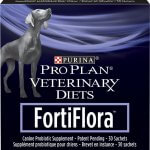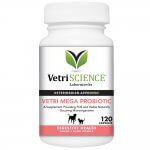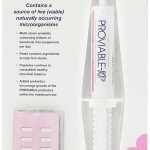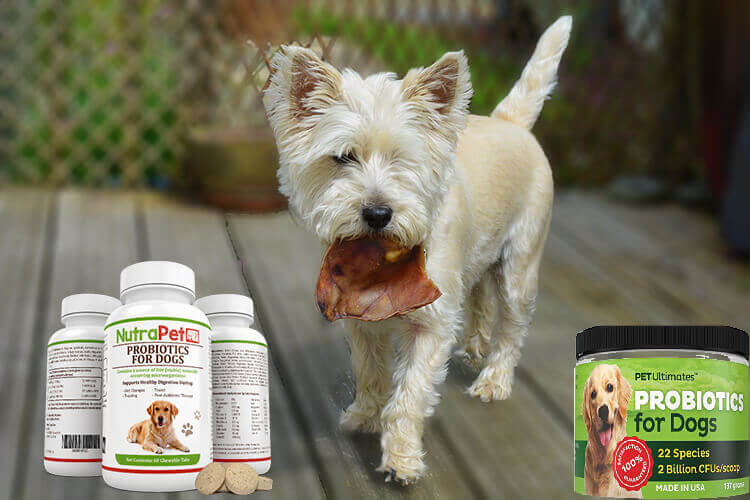Our dogs need to maintain a good and balanced lifestyle. While keeping a healthy diet is one of the best ways to achieve such a goal, it should be noted that there are other ways in which a dog can reach a balanced lifestyle.
Pet owners can urge their dogs to commit to a regular exercise. They can also groom their canine friends to keep the latter clean and free from disease-causing parasites. Owners should also ensure that their pets have adequate social wellness in order to keep them sane throughout.
However, unknown to some pet owners is the need to provide their dogs with supplements that would help their digestive system perform well. Here enter probiotics.
What are probiotics?
Probiotics are live microorganisms that could help keep the balance of the microflora or the organisms present in the intestines when taken in adequate amounts. Ingesting probiotics can regularly improve one’s gastrointestinal health.
Some studies show that probiotics have helped humans treat several stomach and intestine problems, including diarrhea and cramping brought about by antibiotics. Probiotics may, likewise, help replace the bacteria lost due to an intake of antibiotics.
In humans, probiotics are being studied for its effects on more severe gastrointestinal diseases, including colon cancer and irritable bowel syndrome (IBS).
What are probiotics for dogs?
Like probiotics taken by humans in terms of function, probiotics for dogs also contain good bacteria that provide a myriad of benefits to dogs. Probiotics may help inhibit the growth of harmful microorganisms in a dog’s intestines, including E. Coli and Salmonella sp. It should be noted that the probiotics that humans take are different from those that dogs need to take in. There may be harmful repercussions if you feed them with human probiotics.
Several veterinarians have noted that probiotics may provide extensive effects to dog’s gastrointestinal health as it helps prevent or treat problems such as loose bowel movement (LBM) and diarrhea.
It should be noted that dogs’ probiotics are considered more as food supplements than an actual meal. So it should be noted that probiotics should not replace dog food. A real meal should still comprise your dog’s diet for the dog to attain a healthy lifestyle. As pet owners, you still have to ensure that your dog avails of the best dog food.
Are probiotics safe?

Source: http://www.chinesemedicinedoc.com/
While it is true that probiotics contain live bacteria, probiotics are generally safe for consumption. Most probiotics contain microorganisms that are already present in the dog’s digestive system.
Probiotics have been used extensively in various ways since time immemorial, including fermentation of food products. It is observed that there were no reports of side effects caused by the intake of probiotics.
Where are probiotics usually found in your dog?
Like the human body, your dog contains trillions of microorganisms scattered across different parts of his body. Many of these minute organisms are probiotics, and they contribute to the defense and immunity of your dog. As many as 80% of these are found in his gastrointestinal tract: from your dog’s mouth and teeth to his anus.
Good bacteria keep your dog’s mouth healthy. They are your pet’s first line of defense against harmful bacteria and viruses. They also reside in your dog’s pharynx, where they keep it free from pathogenic bacteria, which could cause pharyngitis and other inflammatory diseases.
Probiotic bacteria are also present in organs which play significant roles during digestion. These bacteria have to survive from the acid, enzymes, and bile from the stomach, pancreas, and gallbladder. Many bacteria are also present in your dog’s small intestines, where minerals’ absorption occurs.
Much of the dog’s probiotics are found in his colon. It is where the probiotics unleash their beneficial effects. They also replenish the good bacteria that aid in digestion and absorption of nutrients.
The anus also houses a lot of good bacteria. Probiotics help remove the toxins present in the anus, hence assisting in the body’s detoxification process, where millions of microorganisms leave the body through ingestion or defecation.
What benefits do dogs get from taking probiotics?
Several studies suggest that probiotics offer many benefits when taken in by dogs. These research studies are backed by an increasing number of vets across the world. The concept of probiotic use is still somewhat new in the canine community since traditional vets may still have qualms about such effects.
However, modern and holistic vets have agreed that there are effects or benefits of taking probiotics. Primarily, probiotics for dogs help boost their immune systems’ functionality, decreasing the likelihood of problems such as diarrhea, obesity, and liver disease. Probiotics also help ease gastrointestinal abnormalities, further regulating your dog’s bowel movement.

Source: http://www.dogsnaturallymagazine.com
Many veterinarians suggest that a regular intake of probiotics would provide your dog a better skin and coat appearance. Such supplements may also reduce allergy diseases and yeast-associated disorders.
Finally, probiotics are observed to have positive effects on your pet’s moods and behavior. Many new dogs arriving in shelters are given a great probiotic supplement to cope with the abrupt change in lifestyle and environment.
How do probiotics work?
Probiotics help bring your dog’s gut bacteria into a healthy balance by introducing beneficial bacteria that would reside inside his gastrointestinal tract. When the good bacteria outnumber the harmful bacteria, the former would not flourish and function well.
To carry out their function, probiotics produce short-chain fatty acids that may prevent the growth and harmful bacteria such as Salmonella sp. and E. coli.
Furthermore, probiotics may help inhibit allergens from passing through the gut into the blood vessels, where they can cause widespread infections in the body. It is done by strengthening your dog’s gut membrane.
With a healthy gut due to probiotic intake, your dog will be able to produce specific vitamins that would keep him sharp and revitalized. Furthermore, vegetable fiber will be highly utilized.
It is essential to note that beneficial bacteria rely on the dog’s diet to function well. By taking in carbohydrate-rich food, you run the risk of increasing harmful bacteria in your dog’s gut. As pet owners, you should also take into consideration the diet of your dog. To help the probiotics perform their function well, you should invest in the best dry dog food for your pet. These are healthy dry food which provides the essentials to keep your dog alert and healthy.
Can Dogs Be Given Probiotics for Humans?
While there are no robust studies on the ill effects of giving probiotics meant for humans to our canine friends, veterinarians recommend that pet owners only give probiotics explicitly intended for dogs to their pets. In this way, you have ensured that such probiotics for dogs contain the bacteria strains needed by your dog’s gut.
There are differences in the biological makeup of humans and dogs, specifically their gastrointestinal tract. It is safe to provide your pet with probiotics designed for dogs rather than run the risk of feeding him with a product meant for humans.
How Many Probiotics do Dogs Need?
Probiotics may vary depending on the number of the microorganisms present and the type of bacteria strain. The higher the amount of its colony-forming units (CFU), the more efficient the probiotic supplement is. Therefore, it must look for a probiotic with high bacteria colony count or high CFU and the probiotic with several strains. It will guarantee you that your dog will receive enough probiotics.
It is essential to look at each product’s label so that you will be directed to the proper dosage. If ever you observe certain side effects, including the development of loose stools, try to reduce the dosage of probiotics.
How Do Owners Handle a Probiotic Supplement?
Since probiotics are eaten, they should be treated like any food your dog eats. Hence, it is crucial to follow certain ways to handle these probiotics properly.
Primarily, you would not want to expose the probiotic product in an environment with high temperature because this would most likely kill the product’s microorganisms. Be sure to store it in a cool place and immediately refrigerate it once you have arrived home.
Furthermore, exposure to moist and air would also affect the viability of the probiotics. It is why proper management of probiotics is essential to containing its efficiency until you feed it to your pet.
Also, it is vital to check the expiration date of the probiotic supplement. It will ensure that your dog receives live and active strains of microorganisms.
What are the Best Strains of Dog Probiotics?
Many strains of probiotics carry different functions. However, there are specific strains that are found to be essential to dogs.
Primarily, the Bifidobacterium animalist is a bacteria that protect the digestive tract. It has been known to reduce the time it takes for acute diarrhea to resolve in dogs. Furthermore, Lactobacillus acidophilus helps improve the quality of your dog’s stools. Lactobacillus rhamnoses, on the other hand, aids in the defection of your pet. This strain also helps stabilize your dog’s intestinal microflora by flourishing out pathogenic bacteria.

Source: https://alchetron.com
These are just some of the many strains which are present in dog probiotics. Be sure to check the label to identify the strains present.
How Will You Give Your Dog Probiotics?
Probiotic products may be taken by dogs orally. It can also be included in their food or mixed with a treat. Each product has its instructions, hence the need to read the label correctly before administering a probiotic to a dog. Without proper administration of the probiotic, the product may not perform its function well.
Pet owners should also consult their veterinarians before administration of the probiotics. It would help if you considered their vet’s advice regarding the manner of giving the probiotics and the quantity of the product. Your vet may provide the ideal perspective with regards to probiotics for dogs.
Types of Probiotics for Dogs
Best probiotics for dogs come in different types like
- Probiotic powders
- Yogurt or kefir fortified with live cultures
- Probiotic chews
- Dog foods containing probiotics
- Probiotic Capsules
Risks and Considerations of Probiotics for Dogs
Probiotic supplements are generally considered safe for dogs, and there are not many known serious side effects either. In rare cases, side effects can happen, but these are mostly allergic reaction, and the symptoms include:
- Increased itching
- Swelling of the lips or tongue
- Difficulty in the breathing, etc.
Probiotics are essential not only to maintain the overall health and well-being of your dog but also addresses specific health issues such as digestive disorders, lowered immunity, lack of energy, etc. At the same time, there is a great range of products available in the market.
Probiotics for dog skin allergies
Depending on what type of allergy is causing skin irritation, veterinarians usually prescribe antihistamines, hydrocortisone, cortisone or a combination of medications. Unfortunately, these drugs only treat the symptoms and not the allergy source–a poorly functioning immune system and GI tract.
Skin allergies may be exacerbated if the dog’s digestive system is not functioning as it should be. Having a healthy GI tract is essential for dogs because all food nutrients are absorbed and assimilated by the body.
What are the Best Probiotics for Dogs?
There are several probiotic supplement products available in the market. Many of them have been praised for their quality, yet a lot of them seem to have lots of lapses in terms of their efficiency. To give you a guide on which to buy, here is a rundown on some of the best probiotics for dogs that are sold in the market.
1. Purina Forti flora

Perhaps the most sought-after dog probiotic, Purina Forti flora, is known for its effect on dogs’ digestive health and immune system. Aside from its bacteria content, the probiotic contains essential minerals, including vitamins A, C, and E, and antioxidants. Since this is a powdered product, it has to be sprinkled on your pet’s usual meal once a day. Purina Fortiflora comes in sachets, so there is no need to measure the right dosage.
However, it should be noted that certain dogs may not eat their food with the powder, especially when they are eating dry food. Pet owners should also consider the price of the product since it is quite expensive.
2. Nusentia Probiotic Miracle

Nusentia Probiotic Miracle is another dog probiotic with stellar reviews in terms of its efficiency. Odorless and organic, this probiotic aids in overall digestive health. Known for catering to pets’ food sensitivities, Nusentia Probiotic Miracle aids in clearing up the skin and the eyes. It has also been reported to have improved yeast conditions and joint inflammation issues.
In terms of administration and dosage, the powdered product should be added to your dog’s regular meal once a day. However, if the said supplement is stored incorrectly, it may check and become ineffective for dogs.
3. VetriScienceVetri Mega Probiotic

Affordable and effective, the VetriScienceVetri Mega Probiotic is another probiotic product that is great for more sensitive dogs who may have dairy product issues. As it is a non-dairy product, many veterinarians recommend this for lactose intolerant dogs. The VetriScienceVetri Mega Probiotic comes in capsules, so you have to open it and sprinkle its powder on your dog’s meal.
It does not contain any flavor, so it would not be an issue for most dogs to take it with their food. It should be noted that the probiotic may not be ideal for dogs with sensitivities to grain food.
4. Nutramax Proviable DC

Known for its flexibility, the NutramaxProviable DC is a probiotic product that helps treat severe diarrhea cases. With seven strains of bacteria, including Bifidobacterium bifidum and Enterococcus faecium, you are ensured of its effectiveness in maintaining the overall gastrointestinal health of your dog. For those with severe diarrhea cases, a short-term paste is provided as a medication to your dog for a few days.
For a general boost in overall health, the NutramaxProviable DC may be fed to your pet or sprinkled into their regular meal. You may want to consider the fact that overuse of the paste may cause constipation. It would help if you talked to your vet first before administering the probiotic.
5. Amazing Nutritional Probiotic Joint
The Amazing Nutritional Probiotic Joint is an organic probiotic for dogs, especially those with food sensitivities. It comes in tablet form, so the product should be chewed by the dogs for its effect to kick in.
The company has stressed that if you see no improvement within 60 days, you may refund your money back, guaranteed. Although efficient and affordable, some dogs may not prefer the taste of the product. Others may not like the sensation of chewing the tablets.
Probiotics are essential for the overall wellness of your dogs. Such a product offers a lot of benefits for your pet, especially to their gastrointestinal health. However, it should be noted that much attention should be put into the administration and dosage of probiotic products to avoid any side effects.
Cost of Probiotic Supplements in Dogs
The cost of probiotic supplementation for your dog will depend on the foods and products you select and could range from as low as $10 per month to $50 or more.
Got some questions? Or some suggestions? That’s why we’ve got a comments section on this blog! You can feel free to leave a comment or two down below, and we’ll get back to you as soon as possible!
We love reading your messages……

We provide best probiotics for dogs and cats and nutritional supplements for dogs with reasonable price at elitepetnutrition.com.
Good article..very helpful information for related dogs..!